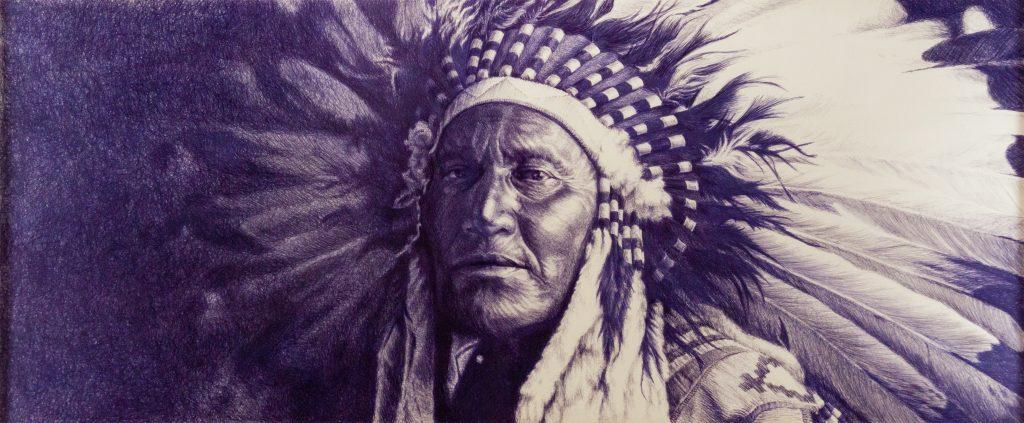Autumn is the season during which we grind our kosher salt into the open veins of indigenous American peoples, seasoning them for our greedy mouths to later devour. Like our Thanksgiving turkeys, we carve out the bits and pieces of history that we find offensive and discard them. We have rewritten the lines of time in our harsh English words, so guttural in comparison to the lilting tones of Lakota song. It was more than their lives we stole. We also absconded with their culture.
Each year that I live to see another Columbus Day, I come to resent it a little more. I’m not sure what we’re celebrating, but I can tell you this much – it gives me the creeps in a serious way. We might as well dedicate a day to Hitler.
“Guess what, kids! It’s April 20th! No school today. We’re all staying home in reverence of the great leader Adolf Hitler.”
“Didn’t he murder a bunch of people?”
“Well, sure, but he also made some paintings.”
“Works for me.”
It’s so horrendously disrespectful. As though it’s as normal and reasonable as the phases of the moon, on a yearly basis, American citizens celebrate the life and “achievements” of an Italian “explorer” who “discovered” the “Indies” and also perpetrated one of the most horrific genocides in human history. As governor in Haiti, in a period of two years, Columbus had exterminated more than half of the indigenous population. But we don’t talk about that. We teach our children nursery rhymes instead. No wonder Native people think we’re thick in the head. Each year that we fail to repeal that atrocity of a “holiday” is another inch of the knife that sinks into the hearts of Native Americans. It’s remarkable they’ve any spirit left at all. One would think they’d be too weak after all this bloodletting.
Halloween must also be an unpleasant day for Native Americans, given that my people have taken to wearing their very beings as costumes. It’s odd that we have conniptions over people dressing in blackface, but not over costumes that incorporate sacred Native ceremonial items. Both offenses warrant a strong response. But I guess I shouldn’t be surprised; after all, I do live in a country that proudly boasts a football team called the Washington Redskins. I mean, really, Redskins? We would all just absolutely lose our minds if the name was “Blackskins” or “Yellowskins” or “Whiteskins.” Yet it’s perfectly fine to call them “Redskins.” It defies all reason. (And for those Caucasians among you who are thinking that you wouldn’t be offended if the team was called “Whiteskins,” that’s because you belong to a racial group that isn’t oppressed.)
Thanksgiving is hardly better. I remember visiting Plymouth Rock as a child. My mother’s side of the family is from Massachusetts, so we used to travel there frequently. On one such trip, my grandmother brought me to Plimouth Plantation, a recreation of a 17th-century English settlement. Even the actors and tour guides of Plimoth Plantation spun me the same bizarre tale of camaraderie. Rather than telling me the story of how Native Americans, in their wisdom and forgiveness, saved the frigid white asses of the Pilgrims, they told me about how the groups mutually came together to help each other out during a particularly difficult fall season.
They neglected to tell me about how the Pilgrims and their progeny systematically murdered the Natives thereafter because they wanted to steal their land and pillage their resources. On the whole, I really don’t understand the modern American conceptualization of Thanksgiving. It should be apparent to any thinking adult that the story, as it’s told, is riddled with flaws, the largest of which being as follows: Why would the Natives, who had subsisted off the land for thousands of years, suddenly need the help of a group of uneducated foreigners with no knowledge of the ecosystem whatsoever? I rest my case.
At a recent event honoring Navajo code-talkers, our president used “Pocahontas” as a racial slur for a current senator claiming Native American ancestry. Clearly, disrespect and misunderstanding toward indigenous Americans is a systemic issue. Until we begin to treat the suffering of Native Americans with the same sensitivity as that of other races, we perpetuate racism and draw out a genocide of culture that has been ongoing for over five hundred years.





